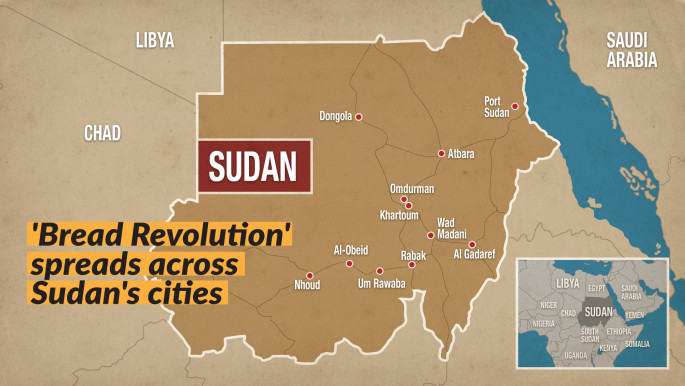Deadly protests have rocked Sudan since December 19 after a government decision to triple the price of bread.
"It is absolutely unacceptable for security forces to use excessive violence to crack down on demonstrators, to use detention without charge, certainly unacceptable to use brutality, torture .. and needless to say there's no reason anyone should be killed," said Cyril Sartor, senior director for Africa at the US National Security Council.
The US-Sudan negotiating process "which could eventually lead to the lifting of state sponsors of terrorism designation... is being threatened by the current developments", Sartor told AFP in an interview at the end of a four-day visit to Khartoum.
The protests since December quickly escalated into nationwide rallies against President Omar al-Bashir's government, with demonstrators chanting their catchcry of "freedom, peace, justice".
Officials say 31 people have died in two months of protest-related violence, while Bashir, who swept to power in an Islamist-backed coup in 1989, has remained defiant.
Human Rights Watch says at least 51 people have been killed, and hundreds jailed in a widespread crackdown by security forces on protesters, opposition leaders, activists and journalists.
In October 2017, the United States lifted its trade embargo imposed on Sudan in 1997 for alleged links to Islamist groups.
Al-Qaeda founder Osama bin Laden lived in Sudan between 1992 to 1996.
Despite lifting the embargo, Washington has kept Sudan on its list of alleged state sponsors of terrorism along with Iran, Syria and North Korea.
'Clear message'
Ties between the two countries improved during the adminstration of former US president Barack Obama.
They are now negotiating on the process to remove Sudan from the blacklist, seen as a major obstacle to the African country's economic recovery.
Bashir has blamed the United States for Sudan's economic woes, insisting the embargo coupled with the terrorism listing kept international businesses away from Sudan.
For Sudan to be removed from the US blacklist, it has to meet certain benchmarks set by Washington, which include protecting human rights and allowing freedom of expression and religion.
Sartor acknowledged that Sudan's increased cooperation in countering terrorism in the region has helped boost the talks, but the negotiations could still be derailed unless Sudanese authorities rein in the crackdown on dissent.
"We have been quite clear, quite explicit ... with all the government leaders that I have met with that the current conditions in Sudan and the overreaction of the security forces in particular put the talks at risk," said Sartor.
"There can be no confusion about our message, about the sincerity of this view from senior leadership in Washington," he said as he called on Khartoum to release all political prisoners.
"Holding them only impedes the process of dialogue."
Critics say Washington's response to the crackdown had been mild so far, charging it had failed to take a stand on the protest movement.
'No outside solution'
Sartor said it was not up to the United States to offer a solution to Sudan's political crisis. "In fact no outside force can impose a solution," he said.
"What we are witnessing is all about the people of Sudan who are seeking to have their voice, to have their views, to have their concerns injected into the political dialogue," said the US official.
"So, this is all about the people of Sudan finding a way to get to a solution."
Sartor said the United States wanted the talks on the blacklist to succeed, which would then encourage global financial institutions to come to Sudan.
"We are not at a stage of halting talks," he said. But he warned that the process could stop "abruptly".
"It is imperative that the government stop reacting with the tactics that it has been using to deal with the current situation," Sartor said.
"That's a deal breaker. But we will try in every way we can to work together."
Follow us on Twitter: @The_NewArab






 Follow the Middle East's top stories in English at The New Arab on Google News
Follow the Middle East's top stories in English at The New Arab on Google News


